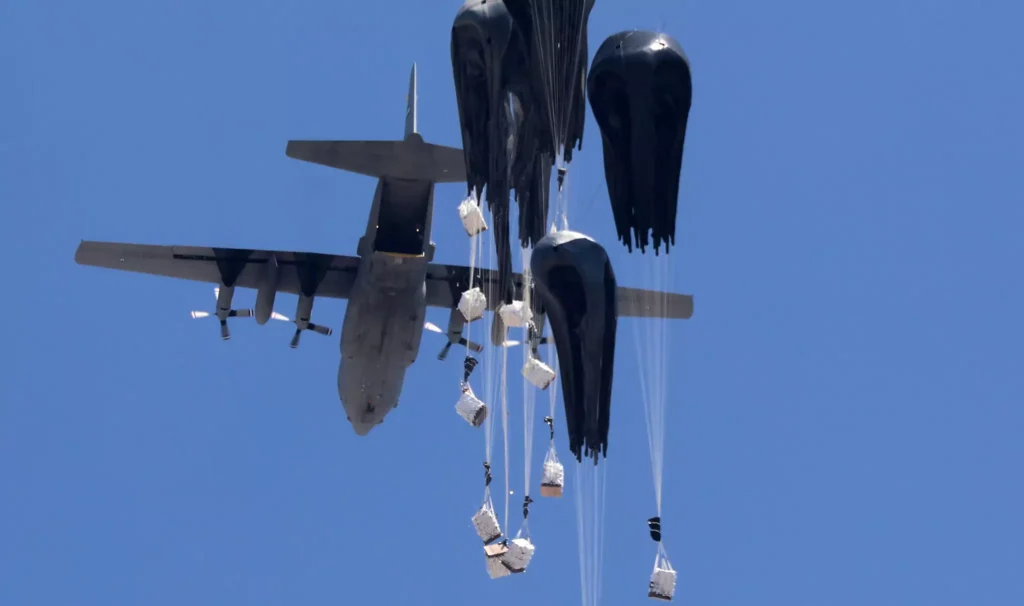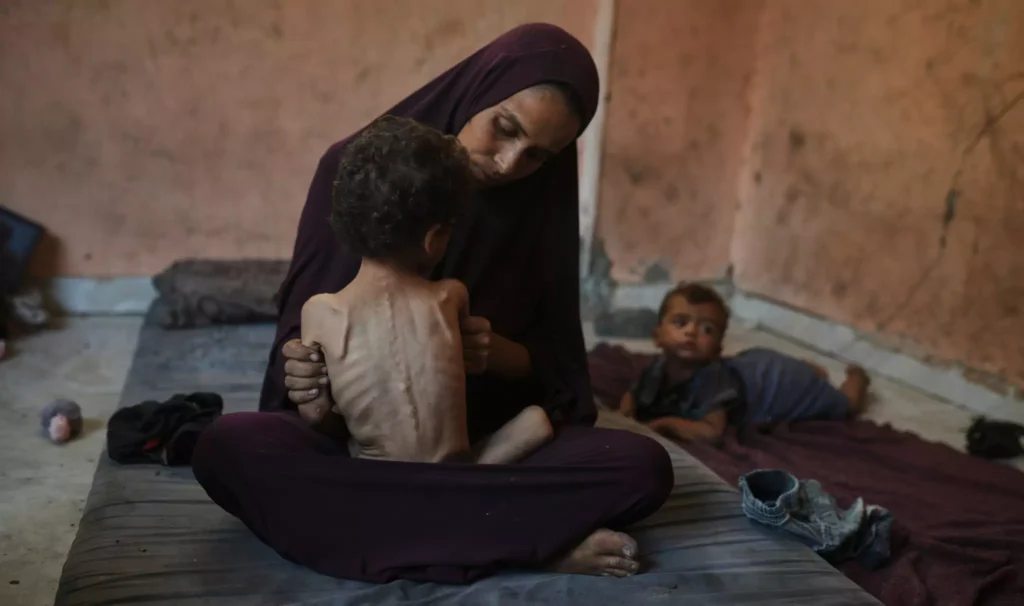But ‘humanitarianism’ that omits naming the perpetrators or enablers just soothes public conscience and obscures complicity. Stripped of context, images of starving children trigger pity, not justice. Genocide becomes spectacle.
There are many parallels between the current catastrophe in Gaza with the Biafra war in Nigeria from 1967-70. That war caused between one and three million deaths, mostly by famine, as Nigerian federal forces – backed and armed by Britain – tried to stop the oil-rich region of Biafra from seceding from the country.
Then as now, humanitarianism served the British establishment as distraction – with expressions of dismay at suffering, while continuing to support the perpetrators.
Narrative management
British media coverage of Biafra was very limited initially but from mid-1968, images of starving children – their bellies swollen from kwashiorkor – flooded Western outlets and dominated headlines.
The surge in media attention brought increased scrutiny of Britain’s role. Some outlets acknowledged that Britain was arming Nigeria primarily to protect British oil interests, then controlled by Shell and BP.
However, in a supposedly post-colonial era, when Britain was frequently criticised by newly independent nations for its lingering influence, openly defending these interests risked a political backlash.
Labour’s then foreign secretary Michael Stewart, addressing the Commonwealth Correspondents Association in December 1968, cautioned: “It is extremely important that we should not appear to try to order their affairs as if the colonial empire was still in existence”.
To manage this tension, the British government launched what former BBC correspondent Frederick Forsyth – who left to report independently – described in July 1969 as “an unremitting public relations campaign… to persuade Parliament, Press and public of the righteousness of Nigeria’s cause”.
The government’s public line framed the war not as a battle over oil, but as a fight to preserve African unity. Stewart warned on BBC Panorama in July 1969 that partitioning Nigeria risked “tearing Africa into 2000 pieces” – a scenario he said would threaten regional development and undermine the Commonwealth, the cornerstone of Britain’s postcolonial foreign policy.
British ministers defended their continued arms sales to Nigeria as a supposed lever of moral influence. In a January 1969 interview, prime minister Harold Wilson claimed Britain was “not unconditionally behind the Government of Nigeria”, insisting it supplied “very limited” arms only to exert pressure on Nigeria over “control of their troops, massacre, [and] genocide”.
Behind the scenes, the Foreign Office maintained close correspondence with the BBC to shape coverage and prevent scrutiny of Britain’s commercial interests.
British high commissioner to Nigeria David Hunt wrote to the FCO in 1969 stating: “I very much hope that you will keep on at the BBC… I hope you never forget that they are our enemies. They have decided to follow a policy which is contrary to that of the British Government and contrary to British interests”.
Through such narrative management – both in public rhetoric and media pressure – the British government successfully reframed its involvement from defending oil interests to being a concerned partner in African development.
Depoliticising the conflict
Humanitarian coverage brought global attention but depoliticised the conflict. As historian Lasse Heerten noted, it became “the epitome of humanitarian crisis”, obscuring Britain’s role in arming Nigeria. It also cast Africa as a site of helpless suffering, with Britain as its saviour.
The public response manifested itself in humanitarian campaigns rather than political action. During Christmas 1968, the BBC’s Blue Peter programme raised funds for a mobile hospital. As the camera lingered on a starving child, presenter Valerie Singleton told viewers: “We’re not going to say which side is right, or which side is wrong…except that all war is always wrong. No matter who’s fault it is that thousands are dying every day, it isn’t his fault”.
Such messages, however well-meaning, demanded compassion, not justice, and blurred lines between oppressor and oppressed.
Biafra diaspora groups pushed back. The Save Biafra Committee declared: “It comes back to us”, stressing that “the essential problem is to end the war” and to push for an end to arms sales and for political accountability “from the streets and by pressure and lobbies at every level”.
Yet, over time, public attention faded. As one Guardian article noted in 1969, “perhaps we have become numbed by the sheer persistence of Biafran sufferings”.
British journalist Auberon Waugh captured the core failure of Britain’s humanitarian discourse when he lamented in December 1968: “Not a single newspaper has seen fit to point out that the children are dying as the direct and intended result of a siege which is supported by the British Government”.
From Biafra to Gaza
While the specifics differ, Britain’s role in Biafra half a century ago echoes disturbingly in Gaza today: alignment with a militarised state, media suppression of the true political context, arms exports underplayed or framed as moral leverage, and civilian suffering cast as an humanitarian emergency.
In Biafra, Britain supported Nigeria under the guise of promoting regional stability, masking its true motives: oil and postcolonial influence. Biafra’s demand for self-determination was dismissed and regarded as dangerous fragmentation.
In Gaza, Britain amplifies Israel’s ‘right to self-defence’, while sidelining Palestinians’ right to self-determination. UK military and diplomatic support to Israel is framed as opposition to Hamas, but in reality serves Whitehall’s strategic goals, its alignment with the US, and corporate interests. The consistent thread is a fear of Palestinian sovereignty disrupting Western dominance.
In both cases, focusing on aid, not the structures producing the suffering, operates as narrative management, letting Britain project moral concern while obscuring its complicity.
This is evident in the West’s response to UN special rapporteur Francesca Albanese’s recent report. Calls for a ceasefire or humanitarian aid are permitted but structural critique and demands for divestment from Israel and accountability, are aggressively dismissed.
As in Biafra, a pure humanitarian framing of the crisis in Gaza today risks depoliticising violence and deflecting outrage.
Complicit actors
Take the Daily Express article titled ‘The suffering of little Muhammad clinging on to life in Gaza hell shames us all’, accompanied by an image of an emaciated child. Hailed as a shift in editorial stance, it came after the paper repeated claims made by Israel – not supported by independent evidence – that Hamas “deliberately hides behind civilians or beneath hospitals” and steals aid.
While the article expresses horror at Gaza’s conditions, it omits key causes: Israel’s blockade, the obstruction of aid and the inadequacies of the Gaza Humanitarian Foundation. The silence practically deflects blame from Israel.
Britain’s media have consistently and utterly failed to report the numerous ways in which the British government has been supporting Israel throughout the genocide.
Similarly, while David Lammy’s recent statement links the crisis to Israel’s renewed offensive, by describing events as “a grotesque spectacle”, he positions Britain as a shocked bystander rather than a complicit actor.
Lammy’s words ring hollow given Britain’s continued military support – including ongoing supply of parts for Israeli F-35 jets, following a failed legal challenge.
The mutually reinforcing relationship of British foreign policy and corporate interests is starkly illustrated by a pre-action letter sent by Leigh Day to the Foreign Office last week.
This requests greater transparency around Lammy’s decision to invite staff from Shell and BAE Systems – a British arms manufacturer and major supplier of F-35 components used by Israel – into diplomatic roles to “champion their interests overseas”.
Embedding corporate power at the heart of government erodes policy independence and, in contexts like Gaza and Nigeria – both during the Biafra conflict and continuing today in the Niger Delta – entrenches cycles of violence where people’s lives are subordinated to profit.
Gaza’s starvation is not merely a tragedy – it is a deliberate weapon used by Israel. While the British establishment now appears more willing to acknowledge Palestinian suffering, framing this solely as a humanitarian crisis repeats the failures of Biafra.
True compassion demands naming and shaming those in the British establishment complicit in Gaza’s suffering, to hold them accountable and end impunity.
________________________________________________
Anthony Hayward is a paralegal at Leigh Day, working on litigation against Shell plc and its Nigerian subsidiary seeking remediation and compensation for decades of oil spills. He holds a First-Class degree in History from the University of Manchester, where his dissertation on Britain’s engagement with the Biafra War won the Warren Kinsey Prize for ‘best thesis on a historical subject. Views are his own.

